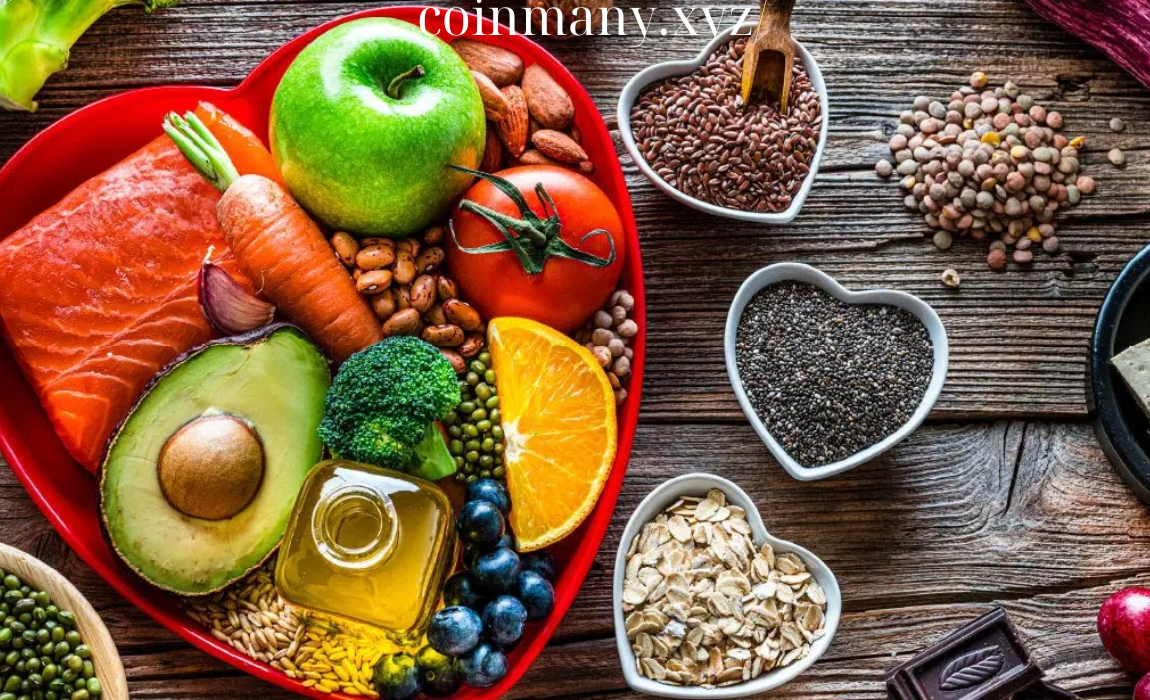
Maintaining a healthy heart is essential for overall well-being, and one of the most effective ways to support cardiovascular health is through a balanced, nutrient-rich diet. A diet for cardiovascular health focuses on foods that reduce cholesterol, lower blood pressure, and improve circulation, helping to prevent heart disease and other related conditions. In this guide, we will explore the key dietary strategies and foods that promote heart health, making it easier to craft meals that support a strong cardiovascular system.
1. Incorporating Heart-Healthy Fats: Omega-3 and Monounsaturated Fats
Not all fats are harmful—certain types of fats are essential for maintaining heart health, particularly omega-3 fatty acids and monounsaturated fats.
- Omega-3 fatty acids: Found in fatty fish such as salmon, mackerel, and sardines, omega-3s reduce inflammation, lower triglyceride levels, and improve overall heart function. If you’re following a plant-based diet, chia seeds, flaxseeds, and walnuts are excellent sources of omega-3s.
- Monounsaturated fats: These healthy fats, found in olive oil, avocados, and nuts, can help lower bad cholesterol (LDL) levels while raising good cholesterol (HDL). Incorporating these fats into your diet can significantly reduce the risk of heart disease.
Ideal for: Replacing unhealthy fats like trans fats and saturated fats with heart-healthy options in everyday meals, such as using olive oil for cooking or adding avocados to salads.
2. Whole Grains: Supporting Heart Health with Fiber-Rich Choices
Whole grains are a cornerstone of any diet for cardiovascular health. Rich in fiber, whole grains help regulate cholesterol levels and improve digestion, supporting overall heart health.
- Oats: High in beta-glucan, a type of soluble fiber, oats are known to lower cholesterol levels. A bowl of oatmeal for breakfast is an easy and delicious way to start the day with heart-healthy benefits.
- Quinoa, brown rice, and barley: These whole grains are excellent sources of fiber and essential nutrients such as magnesium, which helps regulate blood pressure. They make great bases for salads or side dishes that support cardiovascular function.
Ideal for: Incorporating into meals as replacements for refined grains, such as swapping white bread for whole grain options or using quinoa instead of white rice.
3. Leafy Greens and Vegetables: The Power of Plant-Based Nutrition
Eating a variety of leafy greens and colorful vegetables is one of the simplest and most effective ways to protect your heart. These vegetables are packed with vitamins, minerals, antioxidants, and fiber, all of which contribute to cardiovascular health.
- Spinach and kale: High in nitrates, which help dilate blood vessels and lower blood pressure, leafy greens like spinach and kale are critical components of a heart-healthy diet. They also provide ample amounts of potassium and magnesium, which are vital for maintaining normal heart rhythms.
- Cruciferous vegetables: Broccoli, Brussels sprouts, and cauliflower are rich in fiber and antioxidants. These vegetables help reduce oxidative stress, a key contributor to heart disease, and keep arteries flexible and clear of plaque.
Ideal for: Including in salads, smoothies, or as side dishes to boost daily intake of heart-supporting nutrients.
4. Fruits Rich in Antioxidants: A Natural Way to Protect Your Heart
Antioxidant-rich fruits play a crucial role in any diet for cardiovascular health by fighting oxidative stress and inflammation, both of which are major contributors to heart disease.
- Berries: Blueberries, strawberries, and raspberries are loaded with antioxidants such as anthocyanins, which reduce blood pressure and protect against artery damage. A daily serving of berries can significantly enhance heart health.
- Citrus fruits: Oranges, grapefruits, and lemons are rich in vitamin C and flavonoids, which help improve blood circulation, reduce inflammation, and lower blood cholesterol levels. Citrus fruits are also high in fiber, aiding digestion and reducing the risk of heart disease.
Ideal for: Enjoying as snacks, adding to smoothies, or mixing into breakfast dishes for a heart-healthy burst of flavor and nutrition.
5. Nuts and Seeds: Nutrient-Dense Snacks for Heart Health
Nuts and seeds are nutrient-dense foods that provide heart-healthy fats, fiber, and protein. Including a variety of nuts and seeds in your diet can lower bad cholesterol and reduce inflammation, both of which contribute to cardiovascular health.
- Almonds and walnuts: These nuts are particularly high in omega-3 fatty acids, antioxidants, and vitamin E, which help protect against heart disease. A handful of nuts a day can improve heart health by lowering cholesterol and reducing inflammation.
- Flaxseeds and chia seeds: Rich in fiber and omega-3s, these seeds help reduce triglyceride levels and support healthy blood pressure. They can be easily added to smoothies, oatmeal, or yogurt for a heart-boosting snack.
Ideal for: Including as part of a balanced snack, topping salads, or blending into smoothies to add a nutrient-packed punch to any meal.
6. Limiting Sodium and Processed Foods: Essential for Heart Health
One of the most important aspects of a diet for cardiovascular health is reducing sodium intake and avoiding highly processed foods, both of which can lead to high blood pressure and increased risk of heart disease.
- Avoid processed meats and snacks: Processed foods are often high in sodium, unhealthy fats, and preservatives, which contribute to plaque buildup in the arteries. Opting for whole, unprocessed foods helps reduce the strain on your heart.
- Read labels carefully: Even foods that seem healthy can be high in sodium. Always check nutrition labels to ensure you’re choosing products with minimal added salt. Aim for fresh, whole foods like fruits, vegetables, and lean proteins to maintain low sodium levels.
Ideal for: Making a conscious effort to minimize processed foods and cooking more at home with fresh ingredients to control sodium intake and prioritize heart health.
7. Herbal Teas and Dark Chocolate: Heart-Healthy Indulgences
Certain indulgences, when consumed in moderation, can actually benefit heart health. Herbal teas and dark chocolate provide heart-boosting antioxidants and compounds that promote good circulation and reduce inflammation.
- Green tea: Packed with catechins, a type of antioxidant, green tea improves blood vessel function and lowers bad cholesterol levels. Drinking a cup of green tea daily can contribute to long-term heart health.
- Dark chocolate: Choose dark chocolate with at least 70% cocoa content, as it contains flavonoids that help reduce blood pressure, improve circulation, and protect against heart disease. Just a small square can satisfy your sweet tooth while supporting cardiovascular health.
Ideal for: Enjoying a heart-healthy treat in moderation, adding dark chocolate to desserts or sipping on green tea as part of a balanced diet.
Conclusion: Building a Heart-Healthy Diet for Lifelong Wellness
Crafting a diet for cardiovascular health involves making smart, sustainable food choices that nourish the heart and promote overall well-being. By focusing on whole grains, healthy fats, antioxidant-rich fruits, vegetables, and mindful sodium intake, you can reduce your risk of heart disease and support a strong, healthy heart. With the right balance of nutrients, a heart-healthy diet can be both delicious and nourishing, helping you achieve long-term wellness.






